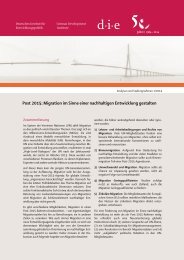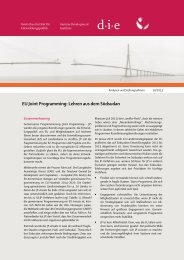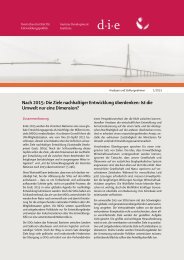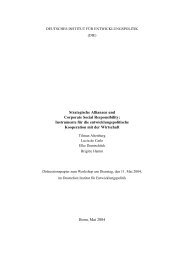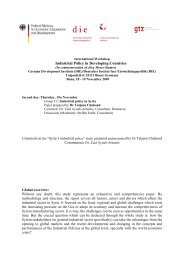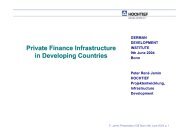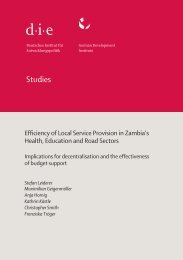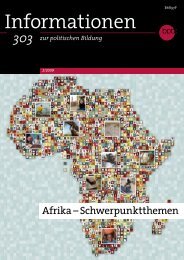Middle East / North Africa and the Millennium Development Goals ...
Middle East / North Africa and the Millennium Development Goals ...
Middle East / North Africa and the Millennium Development Goals ...
Create successful ePaper yourself
Turn your PDF publications into a flip-book with our unique Google optimized e-Paper software.
152<br />
Markus Loewe<br />
German DC should take this state of affairs well into account. In both geographic<br />
<strong>and</strong> sectoral terms it is oriented in such a way as to be able to provide<br />
support, in key places, for efforts to implement <strong>the</strong> MDGs in <strong>the</strong> region.<br />
Never<strong>the</strong>less. it remains unclear what contribution it is in fact providing.<br />
One reason for this is that German DC does not adequately document<br />
what impacts it has (or is intending to have) on <strong>the</strong> MDGs. The o<strong>the</strong>r<br />
reason is that nei<strong>the</strong>r <strong>the</strong> German side nor <strong>the</strong> MENA countries have ever<br />
thoroughly analyzed <strong>the</strong>ir cooperation <strong>and</strong> its impacts on <strong>the</strong> MDGs.<br />
The German government has signed <strong>the</strong> <strong>Millennium</strong> Declaration, <strong>and</strong> it<br />
acknowledges that “<strong>the</strong> MDGs are binding goals, though not comprehensive<br />
terms of reference, for <strong>the</strong> whole of development cooperation. They<br />
indicate what is to be accomplished, although <strong>the</strong>y leave open how <strong>the</strong>se<br />
goals are to be realized” (Bundesregierung 2004, 5). This is certainly correct.<br />
In addition, <strong>the</strong>re is no reason why <strong>the</strong> whole of DC should have to be<br />
subordinated to <strong>the</strong> MDG agenda. But every donor should be able to state<br />
that he is at least providing a relevant <strong>and</strong> significant contribution to reaching<br />
<strong>the</strong> MDGs in his partner countries (BMZ 2005a).<br />
It is getting to be time for German DC to live up to this statement. We can<br />
<strong>the</strong>refore derive <strong>the</strong> following recommendations for future German DC<br />
with <strong>the</strong> countries of <strong>the</strong> <strong>Middle</strong> <strong>East</strong> <strong>and</strong> <strong>North</strong> <strong>Africa</strong>:<br />
6.1 Regional orientation of bilateral German DC<br />
Generally speaking, it is important to ensure that <strong>the</strong> limited resources of<br />
DC in such a way that <strong>the</strong>y achieve <strong>the</strong> maximum possible impacts. This<br />
will usually be <strong>the</strong> case in countries <strong>and</strong> sectors where <strong>the</strong> urgency to solve<br />
<strong>the</strong> existing problems is high <strong>and</strong> <strong>the</strong> partner country’s capacities are limited,<br />
i.e. where DC can make a good contribution to overcoming bottlenecks.<br />
It is fur<strong>the</strong>rmore important to be sure that a partner government has<br />
a certain disposition to solve <strong>the</strong> problems of <strong>the</strong> country, since DC is not<br />
likely to achieve much – or its effects may prove highly vulnerable – if <strong>the</strong><br />
relevant decision-makers in a partner country are not seriously interested<br />
in reaching <strong>the</strong> goals set by DC.<br />
Seen against <strong>the</strong> background of <strong>the</strong> MDGs, it is not immediately evident<br />
why Egypt <strong>and</strong> Morocco should be priority partner countries of German<br />
DC while e.g. Jordan does not have this status. All three countries are<br />
German <strong>Development</strong> Institute



